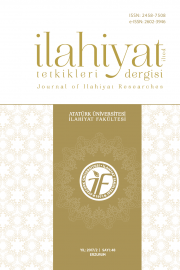Yunus Emre Divanı’ndaki Ayet ve Hadis İktibaslarının Söz Dizimindeki Yeri
Verse and Hadith Quotations in Yunus Emre’s Divan and Their Place in Syntax
Author(s): Hüsna KOTANSubject(s): Language and Literature Studies, Islam studies, Syntax, Turkish Literature, Turkic languages
Published by: Atatürk Üniversitesi İlahiyat Fakültesi
Keywords: Yunus Emre; Divan; syntax; linguistics; quotation;
Summary/Abstract: Yunus, who has a great significance for our literary and linguistic history, whose discourse and the beauty of the discourse has not lost their importance until today and who considered mysticism a maxim for himself, made use of all the opportunities of language and brought his world of emotion and idea into being in his Divan. The real source from which Yunus had inspiration by using a real simple language free from artificiality and uttering his poetry with a nationalistic perception is Mysticism. His world is composed of four significant ideas; ‘Love of Allah, idea of unification, morals and tradition’. While expressing those ideas in his poetry, Yunus made use of various fields of Islamic culture such as hermeneutics, literature, geography, astronomy and especially The Holy Qur’an, verses and hadith, and he masterfully used those in his own language and terminology. As a great Turkish mystic, Yunus placed numerous verses and hadith in his Divan through quotations and references. It is even possible to state that every poem of his takes inspiration from verses and hadith. In this study, Yunus Emre’s quotations taken from verses and hadith will be explained, and their places in sentences will be analyzed in accordance with the principles of generative-reflexive syntax.
Journal: İlahiyat Tetkikleri Dergisi
- Issue Year: 2017
- Issue No: 48
- Page Range: 241-270
- Page Count: 30
- Language: Turkish

